#free!meta
Text
Leaving Teeth Marks
Here at BadPosture studio, it’s always Rinharu propaganda hour. And by "propaganda," I mean reading canon material as plain proof that Rin and Haru are stupid about each other. While the content of the mooks are dreams the characters have, (which take place within the Future Fish AU), they’re nevertheless revealing of their feelings towards each other in the main story. All but the final mook can be read in sequence, which is to say they could reasonably follow the same chronology. The Rin/Haru story is reflective of kid Rin’s perspective, whereas the rest of the mooks depict him in a way closer to his behaviour as a teenager. Despite the disparity between Rin’s attitude towards Haru in mooks 4 and 5, one thing remains the same: Rin wants a bite of Haru.
So…what does this mean? A literal reading is obvious. I mean, really, how much more intimate can a person get than acquainting their mouth with the crook of someone else’s neck? To gain half-fish powers in mook 5, Rin could have drawn blood from virtually anywhere on Haru’s body, but he opts to stick his head in between the bars of the cell to bite down on Haru’s neck. In mook 4, when Nagisa asks Rin what he’d do if he were to catch Haru, he says he’d have “a taste.” Then he elaborates, saying, “That merman is my prey. One of these days, I’ll catch him by his tail and make him mine.”
…Half-fish or not…saying you want to make a person yours? Seriously, if Rin didn’t mean it that way, then why does he say it so sexy? …I’m losing focus here!
The emotional climax of mook 5 is when Haru asks Rin why he’s so determined to show him sights he’s never seen before, and Rin tells him it’s because he wants to share the things he loves with someone else—perhaps because half-fish Haru likely never had those experiences before, or perhaps because Rin didn’t want Haru to resign to simply existing and nothing more. By the end of the story, these feelings are obviously reciprocated, with Haru promising to share sights of his own. Rin likely recruited Haru for their elementary school relay with the same goal in mind—here was someone amazing he wanted to share experiences with. So, whether we read the biting thematically or literally, Rin wants to leave his mark on Haru. In both the main story and mook 5, it was love at first sight for Rin, which is to say that he’s been Haru’s since the day they met.
Taking Haru by the tail and making him his is not unlike Rin initiating the kabedon in season 1 and telling Haru to swim for him. The operative words “mine” and “for” are decidedly much more proprietary than swimming/sharing a dream with Haru. And this is because Rin’s fixation on Haru was perverted into something much more desperate and selfish as he got older. After all, he didn’t quit swimming as a kid because he lost to Haru after being abroad for a year, he quit because despite their separation Haru was able to move on and continue improving while Rin wasn’t. Believing that the effect Haru had on him was one-sided—that Haru didn’t need him and faired no better or worse whether he was around or not—made Rin want to take away the power Haru had over him and use it against him instead.
Of course, Rin had it right the first time. Haru does feel the same way and would, in fact, welcome Rin to make himself at home in the crook of his neck. Incidentally, every time they’ve hugged it out, Rin has propped his chin on the same shoulder he dreamt of sinking his teeth into. Maybe it isn’t such unfamiliar territory after all. Maybe it’s exactly where he belongs.
#free iwatobi swim club#haruka nanase#rin matsuoka#rinharu#free!meta#short and sweet#relatively speaking#badposture tumbles
25 notes
·
View notes
Text
the fact that eric kripke isn't even christian really adds something to the way christianity is depicted on supernatural. because its really not about being christian at all, but about living in america, a country dominated by christianity, and having to decide for yourself how to handle that. faith is huge in supernatural, and the mythology of the show is very bible-centric, but notably, christ is never there. even sam, who starts out revering the angels, who once said he prays every night, doesn't actually call himself a christian or imply that he believes in jesus--the show is steeped in christianity and biblical lore and yet neither sam nor dean are christians. in fact, over and over again the church itself is depicted as a haunted house that sam and dean will only ever enter as strangers, as outsiders. priests, preachers, faith healers, chapels, crypts, etc. are all just iconography that create an intense sense of unease that sam and dean respond to instantly. as a jew, its very relatable. an essential part of living in america when you're not christian is that exact sense of unease, of knowing that the culture of your country has ensured that you'll get knocked over by christianity no matter where you go, that you'll see hundreds of people truly believing they're good people while doing awful things in the name of their god, and you have no choice but to confront that. kripke gets it
#i could actually write an essay about this#kripke is jewish and so is sera gamble#and when i rly think about it i think the show is very jewish#in that its a rejection of the christian interpretation of god and free will#its all about questioning what's put in front of you and i think that's a big part being jewish to me#anyway!#rambles#spn#supernatural#spn analysis#spn meta#faith#christianity#theology#kripke era#eric kripke#sam winchester#dean winchester#castiel#zachariah spn#uriel spn#anna milton#american gothic#fav#🔪
8K notes
·
View notes
Text
🇵🇸 IMPORTANT. Please share. 🇵🇸
If you have Instagram, Meta has set an automatic limit on "political content" as a means to stop the spread of awareness about Palestine, Sudan, Congo and more places where genocide and injustice are being enacted.
You can remove the limit in your settings. Instructions:
1. Go to Settings and Activity
2. Scroll down and click go to Suggested Content

3. Click on Political Content
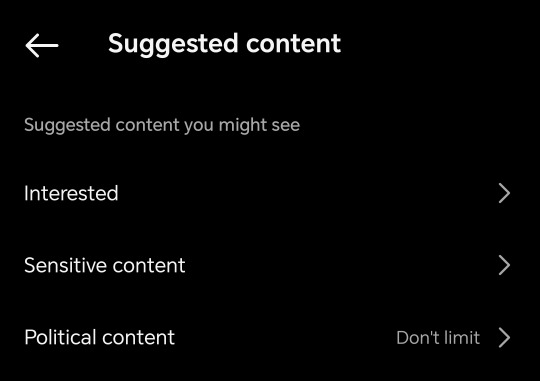
4. Select "Don't Limit"
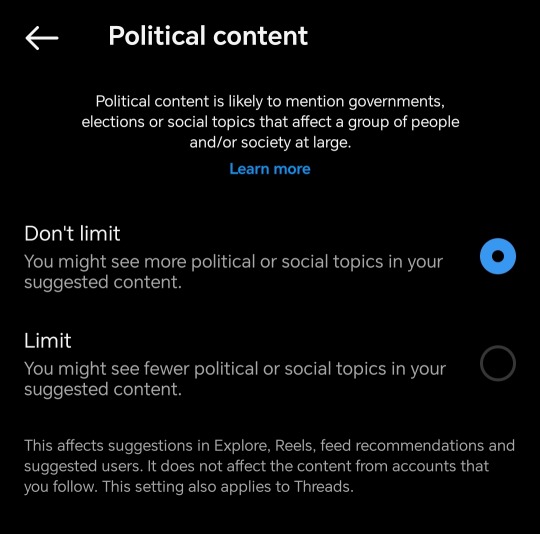
Please share so more people know about this and what to do
#instagram#meta#palestine#congo#sudan#important#please reblog#dont stop talking about palestine#keep talking about palestine#free palestine#gaza#free gaza#from the river to the sea palestine will be free#i stand with palestine#rafah#save rafah#human rights#social justice#social media
5K notes
·
View notes
Text
So those shadowbanning us who work at @meta see these videos everyday, see the torture and turmoil Palestinians are going through and the hate that is spreading...and yet continue on with their jobs. How can people see this and not feel crippled from within by the sheer injustice. My heart hurts. This is expected from an oppressor but those that are just watching on the sidelines...how could you??
#palestine#free palestine#gaza#free gaza#jerusalem#فلسطين#i stand with palestine#Facebook#Meta#israel#Instagram
4K notes
·
View notes
Text
"I've been waiting for ages for somebody to unmask them."

This moment tends to elicit negative reactions in a first read through, and I've got some opinions about why where Kabru is coming from here actually makes a lot of logical sense. So I thought I'd elaborate on that.
I think people hear this and go, "He thinks they must be hiding something because they gave money to someone? What a cynic." Or "he dislikes them because they did charity?? What's wrong with this guy!". And obviously, a lot, a lot is wrong with him. But I think this makes more sense than it seems at first glance! What people evaluating this judgement miss is why Kabru is paying attention to Laios and co to begin with.
Kabru knows of the Touden siblings because (he's a little bit of a stalker-) he is keeping an eye on all the relevant parties in events developing on the island, in order to be able to guide them to his preferred outcome. This includes adventurers because they are the ones actually exploring the dungeon! He's well aware that something as minor as internal tensions between party members could be key to the historical events that are developing. (He would love the assassination of Archduke Franz Ferdinand.)
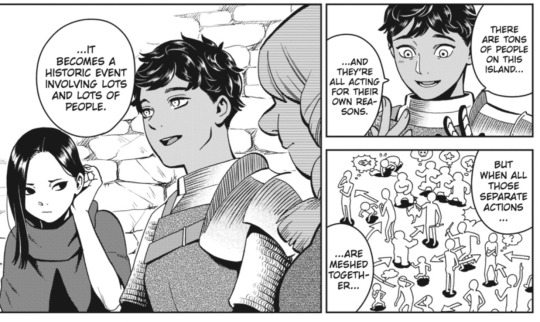
His desired outcome is that whatever the rewards are of breaking the dungeon's curse, whether that's kingship or the ancient elven secrets of dungeons, are claimed by:
A) a short lived person
B) Someone who will be a good, effective leader and/or use those secrets and the power they carry wisely, with foresight, and to establish a political bloc for short lived people.
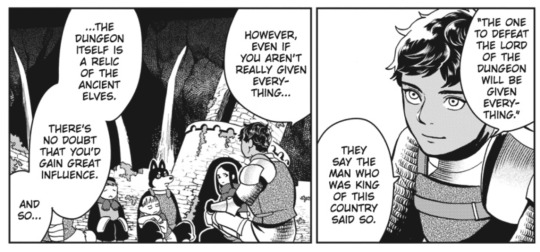
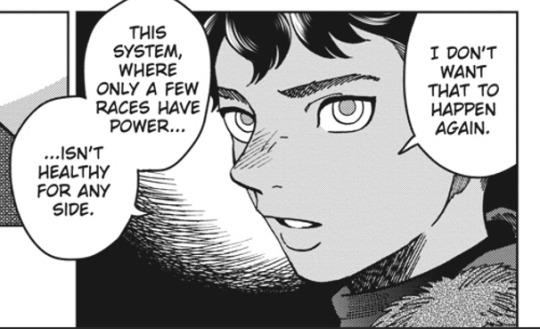
The person he can best trust to do this is, of course, himself. But due to his PTSD regarding dungeons and monsters, he's not able to develop the necessary skills to conquer the dungeon. Once he realises this, he starts looking for someone else who he can support to that end.
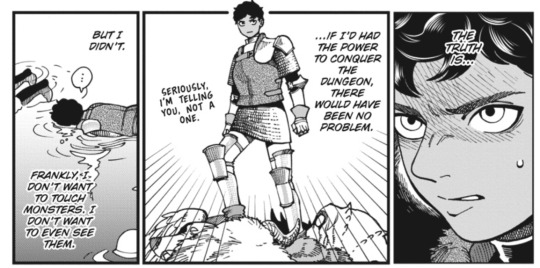
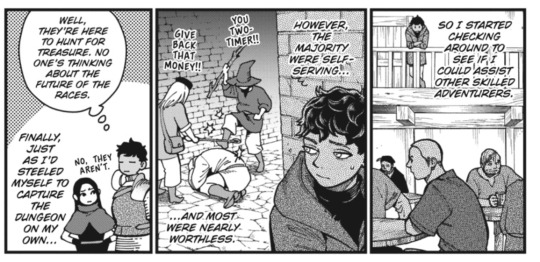
But most of the adventurers don't have any intentions of conquering the dungeon, don't have the skills, or are unsuitable in other ways. In fact, it seems like some potentially suitable people are the Toudens. There are a lot of good rumours about them going around - they actually seem to have a very positive reputation! That's what Kabru means when he says "unmask".

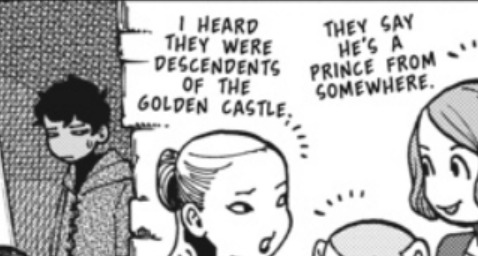

So when Kabru is observing something like them giving money to an old comrade from their gold-peeling days, he doesn't consider it a problem because "they're giving money to this person who doesn't actually need it" or because they must have some dark secret if they act superficially nice. I think he actually understands this situation and what it implies about Laios (in particular) perfectly well.
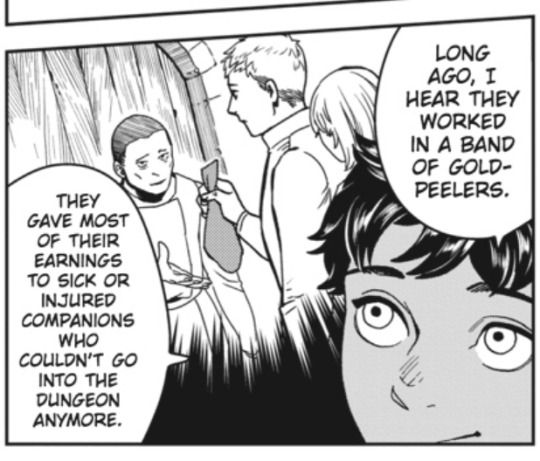
Laios and Falin gave money to an old comrade who got injured and couldn't work. That person then healed up but kept taking their money. Then he used the money to start smuggling illicit goods to the island.
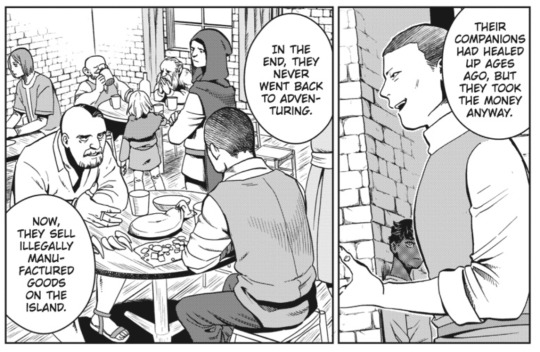
The key is that for Kabru, the problem here is the same as with the corpse retrievers - people using the dungeon's resources to fuel dangerous, selfish, or violent pursuits cause problems for the island, attract more criminals and people with motives other than breaking the curse, and increase the chances of the whole situation ending in tragedy.

Kabru is willing to work with the Shadow Lord of the island if it gets him to his goal - he isn't scrupulous - but the criminal element of the island increasing is something he sees as a major issue.
Also, when you're evaluating someone as a candidate for power, riches, secrets, potentially kingship - then being curious about how the money you give to people is going to be used is kind of a relevant trait!
Interpersonally, Kabru's actually very easygoing - I mean, Mickbell isn't exactly an upstanding guy, is he! But Kabru likes him and they get along well. These traits wouldn't be a problem at all in a friend, or a comrade, or someone Kabru was confident he could use. But he can't get a handle on Laios, and Laios is someone who has the potential to be a major player!
On Laios' end, this is the same as with the marriage seeker who joined their party. She kept asking for things and he gave them to her, because he tries to be nice to others. He even gives her money! It's the exact same thing.
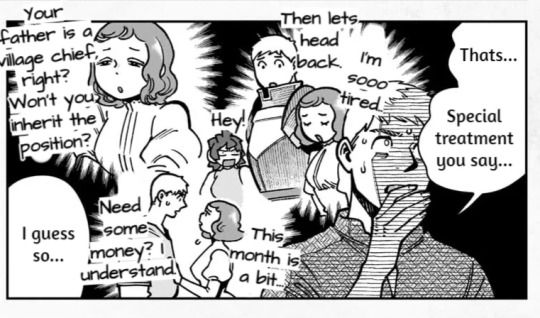
That's fine, but it became a problem because he basically wasn't interested in her motives, didn't notice she was trying to manipulate him, and it also didn't occur to him that the other party members would notice or be affected. We can assume the situation with the gold peeler is the same. When Kabru says that "It's not that they're bad people, they just aren't interested in humans," he isn't wrong.
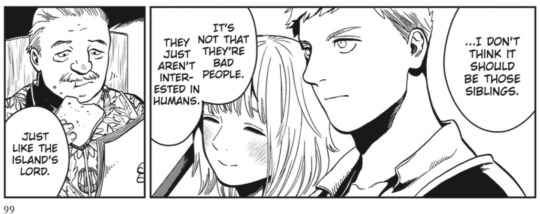
The extent to which this is true of Laios is linked to his autism imo, (because it isn't just disinterest - he genuinely isn't able to notice nonverbal cues that people are lying to him or have ulterior motives) but to a greater or lesser extent I think it's a very common trait. Most people aren't actually that interested in other people who aren't close to them. Kabru is the weird one here. It isn't an issue except as a leader - which is why we see an immediate comparison to the Island's Lord, because that's how Kabru is evaluating them.
And disinterest in/lack of ability with people to the extent Laios exhibits it, it does, actually, make him a worse leader... it's just that as we see in the story, people can help him out. The rest of the party tell him the marriage seeker is taking advantage of him so he tells her he can't give her special treatment anymore. They're pissed and it's a crisis point - he couldn't have recovered their trust without Marcille and Falin - but that's exactly the point. With Marcille and Falin, he was able to recover their trust.
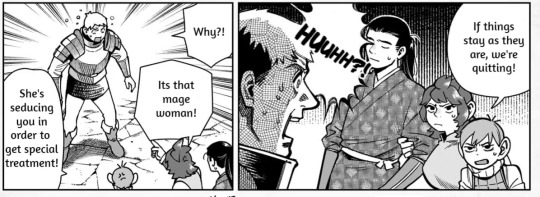
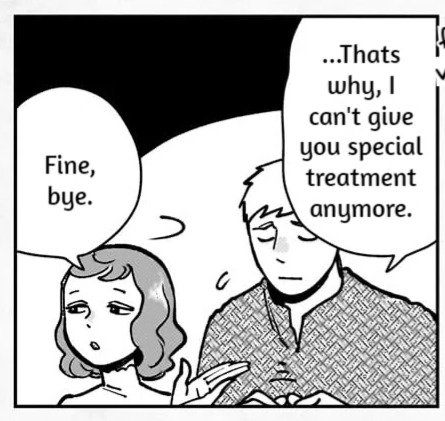
And he has other good traits that make up for it, such as his intelligence, strategic knowledge, open-mindedness and sense of fairplay.
Kabru doesn't disqualify Laios as a candidate based on what he sees about him from afar, though - he still tries very hard to get close to him, obviously hoping that if he manages he can steer Laios to defeat the dungeon and make up for his lack of people-skills in the aftermath. (Which... he does eventually achieve that goal!) He completely fails until the events of the story, so... definitely I think "They just aren't interested in humans" could also partially be a stung reaction to Laios' complete disinterest in him.
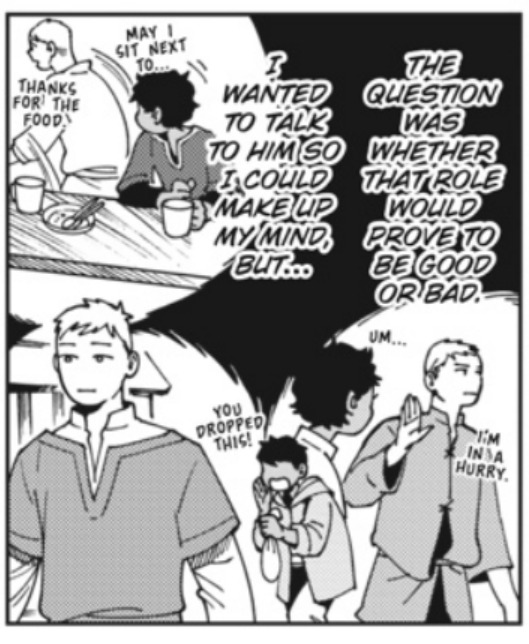
Anyway, that's my read on what exactly Kabru's "issue" with Laios is. Obviously, once he does find out what Laios' true nature is like - about his love for monsters - he develops an entirely new set of fears about Laios' priorities. But since Laios kept that a secret until the start of the story, he has no idea of that yet.
Given all that, I think it's interesting that he says that he doesn't think that the Toudens are suitable to defeat the dungeon, and that he's hoping they'll turn out to be the thieves. As some of his few potential candidates, people who he thinks may play a big role in the island's future, you'd think he'd hope they would be good people!
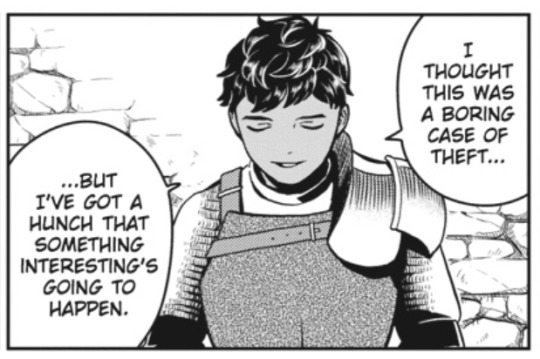
I suppose it's better, in his eyes, because it means that he's involved in something "interesting". They haven't just had their stuff stolen by regular criminals (boring, puts them further away from his goal) - they've been caught up in the beginning stages of "a historic event". The desperate and dwindling group forgetting morals in their quest to retrieve their lost comrade probably appeals to his sense of melodrama. Because he also just... loves drama.
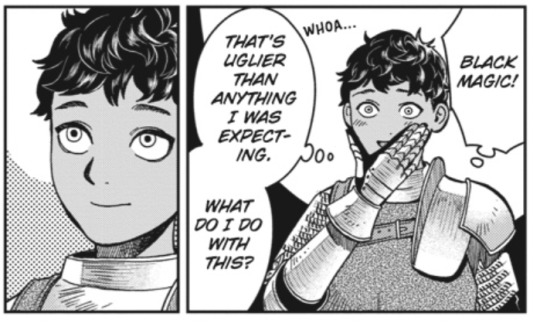
Despite it being "uglier than anything he was expecting", he still pursues Laios as the person he wants to conquer the dungeon pretty much as soon as it becomes clear that he won't be able to do it himself and they are out of time. That's because... well, to be fair, there aren't any other options. And he fits standard A: he's short-lived!
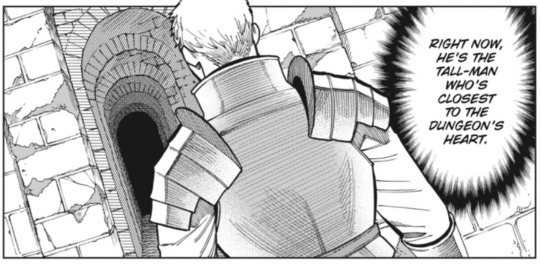
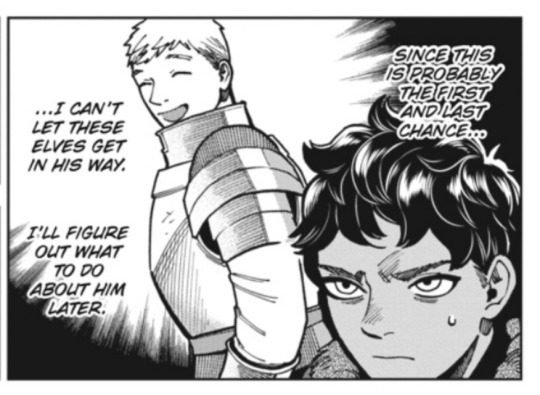
and Kabru still hopes he can fit standard B, too, and be persuaded to use the power he wins for good. No matter how many nightmares he has about Laios, or whether he thinks about killing him. He doubts him, but ultimately he puts his faith in him and seems happy after the manga's ending that he made the right decision.

#dungeon meshi#dungeon meshi manga spoilers#dungeon meshi meta#kabru of utaya#laios touden#labru#laios x kabru#dunmeshi#og post#kabru is such a big picture thinker. and he evaluates people more than he judges them imo#the hater jokes are funny but the people he judges most harshly arent laios and co. they're people like the island's lord.#but you don't see that as clearly because he isn't interested in the island's lord. he understands him. finds him contemptible but useful.#whereas laios lives in his brain rent free because he WANTS to understand him but doesnt quite.#even though he sees the elves as a major threat to his ultimate goals and dislikes the way they treat short lived races#he still understands and evaluates mithrun as an individual based on his own merits#he's one of the characters who is least judgemental in that sense because while he's always making judgements and evaluations#he's also constantly revising them whenever he gets more information#my beautiful machiavellian prince <3#it's genuinely a really laudable way of understanding others imo.#the only problem is that because he's driven towards his goals by his PTSD and survivors guilt#he pushes himself into situations (the dungeon and also interpersonally) that trigger him or even just upset him#without regard for what he authentically wants or his own wellbeing.
2K notes
·
View notes
Text
*bracing myself on my knees and trying to breath, nursing a cramp*
I got here as fast as I can. I just wanted to point out that THIS…
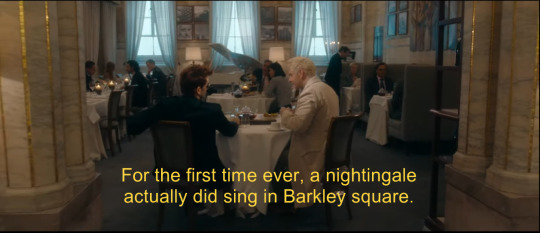
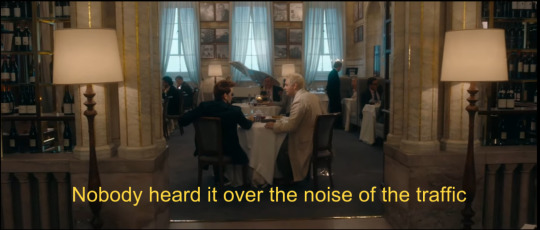
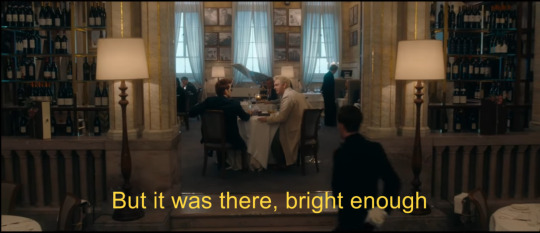
Is one of the gayest fucking lines of television I’ve heard in my life.
Even if the presence of the song itself somehow wasn’t a flashing spotlight enough, the literal voice of God directly draws attention to it. Telling us that in universe, a nightingale really is in fact singing in Barkley square, and to know its music is sweet regardless of if we can hear it. Just like there are really in fact angels (one fallen but we’ll let it slide) dining at the ritz, and they’ve been falling in love regardless of if they’ve been allowed to openly pursue that feeling.
And hell, maybe it’s BECAUSE of the traffic that the nightingale finally sings. Perhaps it wasn’t ready until it was sure no one else could listen.

#couldn't get this across but God's tone of voice on but it was there... is SO telling#there's such a cheekiness to it#part of leaving the garden means leaving that surveillance#being able to make free choices and do so PRIVATELY#WITHOUT fear of consequence#something beautiful and rare is happening at that table#and it's now NONE of heaven or hell's damn business#good omens#ineffable husbands#Crowley#aziraphale#season 1#a nightingale sang in Barkley square#episode 6#1x06#biceratops#meta#analysis
5K notes
·
View notes
Text
“Crowley is still an angel deep down” “Crowley is more of an angel than any of the archangels” “Crowley was only cast out because he needed to play his part in Armageddon, he's not a real demon” “Aziraphale wants to rebuild Heaven to be more like Crowley because he’s what an angel should be” no. Stop it. This is exactly where Aziraphale went wrong.
Crowley is 100% a demon. He's not actually a bit of an angel, and he's not cosmically better than any of the other demons we see in the series. He's much less vicious than most of them, yeah, but he's also much less vicious than most of the angels, because how “nice” a celestial being is has nothing to do with which side they're technically on. Crowley's kindness comes from him doing his best to help people despite the hurt he's suffered himself, not any sort of inherent residual or earned holiness. He was cast out just like the rest of the demons, and that's an important part of his history that shouldn't be minimized, excused, or, critically, 'corrected.'
Being angelic is not a positive or negative trait in the Good Omens universe. It's a species descriptor. Saying that Crowley is still an angel deep down because he helps people is an in-character thing for Aziraphale to think, certainly--Job and the final fifteen showed that in the worst possible way--but it's not something Crowley would ever react well to, and it's the main source of conflict in the entire "appoint you to be an angel" fiasco.
We know that Aziraphale thinks Crowley's fall was an injustice, but why? Well, because Crowley is actually Good, which means his fall was a mistake, or a test, or a regrettable error in judgment, or…something. Ineffable. Etc. The point is, he’s special, much better than those other demons, and if they can fix him and make him an angel again, everything will be fine! (So once Job's trials are over, everything will be restored to him? Praise be!) Aziraphale has to believe that Crowley's better traits come from traces of the angel he used to know and not the demon he's known for 6,000 years, because that’s how he can rationalize his incorrect view of Heaven as The Source Of Truth And Light And Good with his complicated feelings about Crowley's fall.
But Crowley's fall was not an injustice because he's actually a Good Person who didn't deserve it. Crowley's fall was an injustice because the entire system of dividing people into Good (obedient) and Bad (rebellious) is bullshit. Crowley is not an unfortunate exception to God's benevolence, he is a particularly sympathetic example of God's cruelty.
And really, Crowley doesn't behave at all like an angel, especially when he's at his best. All of the things that he's done that we as the audience consider Good are things that Heaven has directly opposed. (See: saving the goats and children in defiance of God in S2E2, convincing Aziraphale to give money to Elspeth despite Heaven's views on the "virtues of poverty" in S2E3, speaking out against the flood and the crucifixion in S1E3, tempting Aziraphale to enjoy earthly pleasures because he thinks they'll make him happy, stopping Armageddon.)
Heaven as an institution has never been about helping humanity. And that's not an issue of leadership, as Aziraphale seems to think--it's by design. Aziraphale's first official act as an angel toward humanity was to literally throw them to the lions. Giving them the sword wasn't him acting like an angel, it was just him being himself. Heaven doesn't care about humans. It's not supposed to. It's supposed to win the war against Hell, with humans as chess pieces at best and collateral damage at worst.
Yes, it's easier to think that there are forces that are supposed to be fundamentally good. It's easier to think that Aziraphale is going to show those mean archangels and the Metatron what’s coming to them and reform Heaven into what it "should" be, and that God is actually super chill and watching all of this while shipping ineffable husbands and cheering for them the whole way. And of course it's easier to take Crowley, who Aziraphale (and the audience) adores, and say that he deserves to be on the Good team much more than all those angels and demons that we don’t like. But that's not how it works. People are more complicated than that, even celestial beings.
Crowley is a demon, and the tragedy of his character is not that he's secretly a good guy who is being forced to be evil; the tragedy is that he's lived his whole life stuck between two institutional forces that are both equally hostile to the love he feels for the universe and the beings in it. There are no good and bad guys. There are no "right people." Every angel, demon, and human is capable of hurting or helping others based on their choices. That is, in fact, the entire fucking point.
#good omens meta#good omens#good omens season 2#crowley#long post#i feel like this is obvious. and yet#when crowley is kind he is NOT acting angelic. the same is true of aziraphale.#(to a point. i do think aziraphale performs 'niceness' sometimes because he feels like it's something he Should do as an angel)#(but that's because aziraphale has so many issues i cannot detail them in the tags of this crowley post)#this is my second long meta post in like 3 days. sorry. it’s my first free weekend in a while
2K notes
·
View notes
Text
Kind of funny. SPN was supposed to end in s5, with Sam in Hell, Cas in Heaven, and Dean on Earth, living with a wife and a son. But it ends after ten more season later with Cas in superhell, Dean in Heaven, and Sam on Earth, living with a wife and a son. Like some fucked up game of musical chairs. Except the chairs are never taken, the song remains the same, and they’re just going in circles. Anyways, Happy November 19th.
#remember that video where Jensen expressed dislike towards the finale#and they basically told him “look at it from the fan perspective” you mean like fans from 10 years ago???#they completely acknowledged that majority of their fandom NOW would not fucking like that ending.#they brought back Becky just to tell Chuck that it fucking SUCKED.#[sigh]#supernatural#spn#spn meta#spn finale#spngate#spn 5x22#swan song#spn 15x20#carry on#chuck won theory#chuck won#team free will#tfw#sam winchester#dean winchester#castiel#destiel#reiotalks
2K notes
·
View notes
Text
All of the kisses in the Locked Tomb series thus far, organized chronologically and described accurately
Inspired by @wifegideonnav's post on Tamsyn torturing us:
Suicidal ten-year-old makes out with corpse; gets possessed
^Same kid gets eyebrow kissy and baptism from hometown butch who she's definitely killed a few times
^Same kid sticks vomit-covered tongue into throat of vicious socialite immediately after lobotomy to forget dead girlfriend
Honorable mention because it happens offscreen: Dead Girlfriend's Mom (haunting same kid) (different haunting) vent-reminisces in memories about her unholy thruple-with-two-bodies
Socialite delivers averted cheek kiss with a womp womp womp
Sloppy bisexual thruple (different thruple) fuck God after lemon queen's ex-husband takes her cannibalized nun-wife's name in vain
Dead planet baby feeling herself; kisses own reflection
DILF distributes daddy forehead smoochies
Dead planet baby perfectly mimics dead bestie's knuckle kiss to codependent bodysharing cousin
Honorable mention because there's plausible deniability: "horrifying noises" made by twins upon reunion
Dead Girlfriend sees girl who owned/tortured her for years, stares longingly; dead planet baby rolls with it
DILF gives real kisses to members of thruple (different thruple-in-two-bodies) before besties mutually explode in death-by-codependency
Dead planet back in second body. Bite.
#this doesn't even count the armbone sex#also I might be missing some bc I can't control-F “kiss” in my paper copies of HtN and GtN; feel free to fill me in#after Alecto I want someone to run data#percent of kisses that are on the lips vs on forehead/hand/cheek#percent of kisses between threesomes vs twosomes#percent of kisses where at least one party is dead#tlt shitposting#locked tomb spoilers#tlt meta#harrow the ninth spoilers#nona the ninth spoilers
2K notes
·
View notes
Text
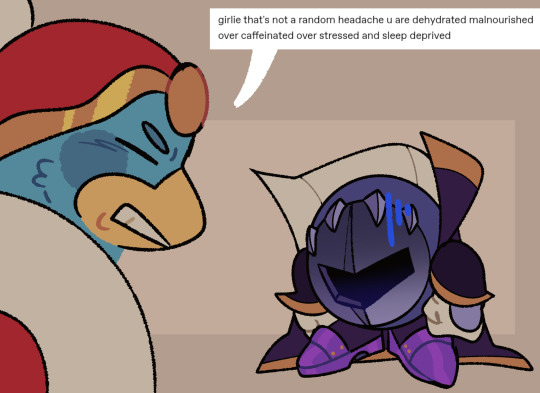
x
839 notes
·
View notes
Text
It just hit me.
The older brother dies on a hunt like any other, believing he did not deserved to be saved. The younger brother burns him on a pyre and tries to live his life, going through the motions without finding any fulfillment in it. He dies too. The angel is back, serving in Heaven. The nephilim is out of the picture. This is exactly how Chuck would've written the ending—right back to where they started
The Chuck won truthing is hitting hard.
#supernatural#spn#chuck won theory#dean winchester#castiel#sam winchester#jack kline#team free will 2.0#spn finale#spn meta
1K notes
·
View notes
Text
Message in a Bottle II
For anon, who asked my thoughts about the character arcs of the primary characters in Free!
My first impression of Rin was not good. I remember thinking, “Who the hell does this guy think he is?” But by the end of the first season, I found out exactly who he is, and I adored him (and still do). Much like how he swims, Rin tends to strike out boldly but loses steam the longer he goes. This is to say that the guy has a hard time pacing himself—he expects too much too soon and becomes disappointed when his abilities fall short of his ambition. Rin’s skill is mostly the result of hard work and dedication as opposed to natural talent, and as he got older, he became increasingly aware of his own shortcomings despite always giving his best. This dampened his carefree spirit and left bitterness and anger in its place—anger at himself for failing to meet his own expectations, followed by anger for being so angry in the first place. I think that Rin internalized the notion that he had to do it all alone, lest he prove himself unworthy of sharing a dream with his father. If his childhood rival could still beat him despite not training and despite being away from him, then he thought he must just not be good enough. The turning point for Rin was being reminded by Haru that they’re stronger together—a truth Rin imparted to Haru back in middle school.
I believe that anger and passion are sisters—the difference between them is their connotation. Anger denotes negativity while passion denotes positivity, but both are indicative of strong feelings either way. Rin is made up entirely of strong feelings. They manifest in the form of goading words, toothy grins, volatile outbursts, and hot tears—all marvellous and all quintessentially Rin. At the end of the day, his biggest hurdle is himself. In his own words, “In competitions, my weakness comes out. I have to win against myself first.” He tends to bite off more than he can chew, and he ends up choking. And yet, the same desire to want to bite down in the first place is what compels him to keep trying and what pushes him to achieve his ambitions. Rin is as dynamic as they come, contradictions abound. It’s contagious.
~~~~
Out of everyone, I’ve taken perhaps the most care and consideration when writing about Haru. Maybe because he’s unconventional and a bit odd, it felt especially important to try to understand him on his own terms. While Haru gives the impression that he’s unfeeling and uninterested, he has a complex inner world that he struggles to articulate to others. He understands the weight of a statement like “I only swim free,” and isn’t the type to say more than he needs to. The problem is that the whole meaning of what he says, while obvious to him, is often lost on others. As a result, Haru often feels misunderstood because he assumes the people around him know how he feels without explicitly being told, when, in reality, they don’t and can’t.
Throughout the entire series, Haru has grappled with being vulnerable, both to the people around him and privately to himself. He’s never said so aloud, but I think Haru spent a good part of his adolescence feeling really lonely. His sense of normalcy involved being unsure that the people who exited his life would actually come back. Maybe admitting to loneliness aloud would just make his feelings all the more real, and he prides himself on being strong and self-sufficient, so acknowledging that feeling wasn’t something he could afford to do. By the time he was a teenager, Haru looked largely numb to the world around him. He went through the motions simply so that he could go home and wish his life away from the bathtub. Once bitten, twice shy, Haru was afraid to let people in because he knew it could hurt both ways. He wasn’t aloof because he didn’t care, it was because he cared so much that it scared him.
Why does he swim and what is it that he swims for? The short answer is love. Haru comes alive when he swims. He’s fully present. It’s the place he goes to hide from himself and it’s the place he’s laid bare and exposed completely. I can’t think of little Haru crying without tearing up myself. He’s got all this love in him, but he doesn’t know how to name it, let alone how to convey it to other people.
It’s incredibly hard not to feel proud of Haru and how he’s grown up. The moments where he’s brave and he vocalizes his gratitude, his fears, and his desires are some of the best moments of the series. The simplest way to plot Haruka’s growth is his willingness to swim in different roles—from soloing in free to being the anchor in the medley to doing all the strokes in university. Throughout it all, Haru is Haru—and he’s pretty damn special.
~~~~
It’s hard to explain why I like Makoto the least out of the main five. His arc centres around his own cowardice or a general lack of self-confidence, but many of his fears are so circumstantial that they won’t follow him around everywhere. He has a fear of bugs, ghosts, the ocean…big deal. Those aren’t things he has to confront on a daily basis. The big one was the fear of water, or of some unknown evil lurking within. This fear never really stopped Makoto from doing anything though, it just meant Haru had to come along too. In the second volume of the Starting Days light novel, there’s a poignant scene where Makoto leaves the house and goes to a place “where Haru isn’t”—the beach. When Haru finds him and asks what he’s doing there, Makoto says, “I wanted to make sure that I would be alright, even if you weren’t here… Would you be alright even if I weren’t here?” In this instance, Makoto is asking whether or not he can stand on his own two feet because he wonders, without Haru, would all he be is fear?
The answer, of course, is no—fear is not Makoto’s defining characteristic. Although he may be unsure of himself at times, the proof is in the proverbial pudding. He can cope with Haru being away and he has the chops to coach others. Makoto’s self-doubt has never held him back from achieving success—save for being unable to be the one to save Rei from drowning out in the ocean, I guess? Still, he was supportive of others while he was afraid, and he was supportive of others when he wasn’t.
Perhaps because I never saw much fight in Makoto (as there was no internal conflict that caused him external grief or affected his relationships), I don’t feel like he developed as a character at all. You know exactly what you’re gonna get when it comes to Makoto. That predictability, while comfortable to some, is boring and frustrating to others. The only glimpse of a different side of Makoto I saw that wasn’t his usual upturned eyebrows was during the water gun fight at Samezuka’s cultural festival. Only for a moment did Makoto seem competitive and unnerving…but it was only for a game.
~~~~
Although he seemed quite cold at the outset, Rei revealed himself to be highly emotive and flamboyant. Rationality and the sublime are usually treated as polar opposites, but Rei embodies both simultaneously. Indeed, he employs theory and calculation explicitly in the pursuit of beauty. His arc deals with self-acceptance and celebrating the things that others perceive as a deficit—his neuroticism, his need to check and double check, and to overprepare. In learning to swim the butterfly, Rei came into his own. Not even he can articulate why, but it was initially the only stroke he could do. The closest thing to an explanation I can think of was that in being taught by the other guys, Rei was trying too hard to live up to the way they swim. Since he had no preconceptions about what the butterfly was supposed to be, he was able to claim ownership over the stroke and do it his own way. Oftentimes, the most precious things are the ones a person struggles to explain.
I think out of everyone, Rei’s admiration of Haru is the purest, because he doesn’t admire his ability to swim, per se. The thing he admires is Haru’s authenticity. Rei knows what it’s worth to live in a way that’s true to oneself because that’s the thing he’s been apprehensive to do since he was a little kid. Essentially, Rei is a spectacled dork. He’s theatrics as much as he is analytical, and the coalescence of these things is beautiful.
~~~
Nagisa’s problems lived in the background where nobody else could really see them. He’s cheeky and his positivity is infallible, but he struggled with finding a (school) work/life balance and preferred to run away from it, hoping that the issue would resolve itself naturally. This wasn’t to be. The short of it was that academics made him miserable. He scored fine in middle school, but all he did was study and so he developed an aversion to it by the time he got to high school. This is to say that Nagisa’s problem is excess, or an inability to do things in moderation. Since he was the one to promote a “come as you are” attitude to Rei before he joined the swim club, it was only natural he return the favour and remind Nagisa that his weaknesses can also be his strengths. The same dedication and tenacity Nagisa applied to the swim club’s recruitment can be applied to standing up for himself to his parents and for finding a way to make schoolwork manageable without sacrificing his happiness in the process.
Nagisa brings his dreams and schemes to life, and he has the uncanny ability to thaw the hearts of those prone to stoicism. He’s just so cute you can’t help but want to look after him!
~~~~
As for which character arc I think is my favourite…it’s hard to say. The most obvious and dramatic was the change I saw in Rin. My feelings toward him did a complete 180, making him my obvious favourite character overall. Anyone who can invoke the full range of emotions is someone really special. I think the person who grew the most, however, is Haru. Comparatively speaking, Haru’s growth was subtle and quiet—it swelled. When I think of him, I feel proud. His hesitancy to be vulnerable is going to be a lifelong struggle for him. He’s going to be misunderstood and he’s going to have to be brave in order to be heard and seen properly. I understand why Haru has so many admirers. It’s bigger than just swimming—a sentiment that governs the whole series and is precisely what has kept me invested in it after all this time. It’s all a big allegory for being true to yourself and authentic with others, I’m telling you! And maybe I’m reading too much into a sports anime and ought to drop the red string and take down the corkboard, but this is who I am, damn it!
#free iwatobi swim club#free!meta#rin matsuoka#haruka nanase#makoto tachibana#rei ryuugasaki#nagisa hazuki#long ass post#badposture answers
17 notes
·
View notes
Text
Some long, big thoughts on Kazuki, Rei, and being “Fathers.” - SPOILERS!
I really think this episode is when Kazuki and Rei really face the reality that they are Miri’s FATHERS. Like, it finally sunk in.
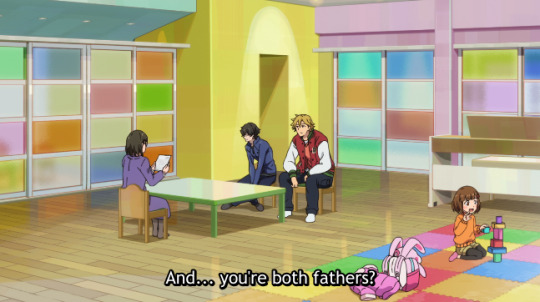
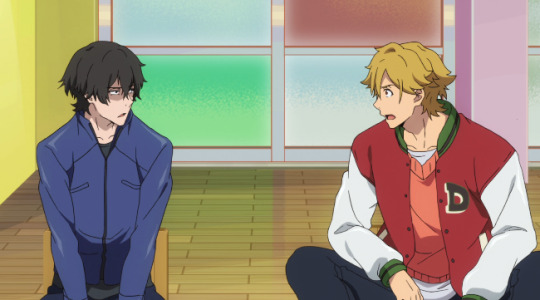
The lady here uses otou-sama, which is a very formal way to address the two of them, very stuffy. But also very...Japanese. In Japan, it is very commonplace nowadays for little kids to use papa and mama when addressing their parents, but those are still seen as loanwords. They don’t carry the same weight as being referred to, and seen as, FATHERS.
That question and how they would be perceived by others really hit them here. They aren’t just playing house at home anymore, they are out in society and are going to be perceived as this Miri’s fathers. That may also come with the assumption that they are a couple or in a relationship with each other.
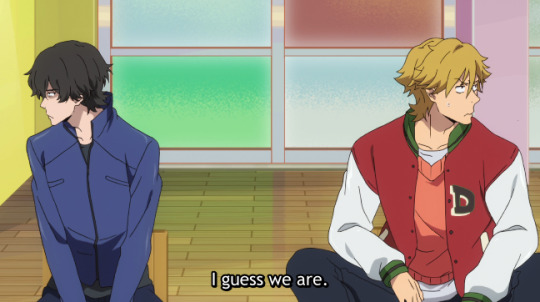
They both look uncomfortable here at that realization, but neither one really denies it either. Of course, this daycare is very unwelcoming and the lady far more judgmental than Anna. So that also likely plays a part in how they feel and react here too. The first daycare they go to focused more on the business side of things.
The room is huge, but empty, the walls are colorful, but not bright. Miri is sent off to play with blocks and the lady never directly addresses her or asks for her thoughts on things. Everything about this daycare is unwelcoming and uninviting and unaccepting, so Rei and Kazuki act coldly to this initial realization and the usage of the word FATHER here, seems very fitting.
It’s not a happy, bubbly, childlike, and even fantastical like the word “Papa” is. And the lady interviewing them, was definitely judging them, even before Miri started mentioning some more...suspicious stuff, lol.
Now, when they go to Aozora Daycare, Anna also addresses them using the word father in Japanese, but she goes with otou-san, still formal, but not stuffy and far more common and approachable. It’s still not “Papa” though. She only uses “Papa” when she talks to Miri about Rei and Kazuki.

(In the Japanese she directly addresses Kazuki first by calling him otou-san and then stating that she was asking Miri, not him, haha).
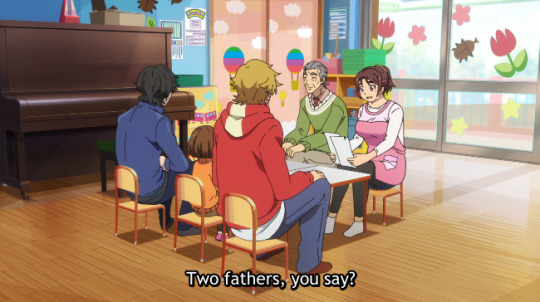
We are met with understanding here, though. Not judgement. The walls of Aozora are filled with children’s art projects, a piano that indicates singing and dancing time as a group, and warm smiles and comfy clothes. Everything that indicates a child-first daycare center.
The whole interview process ends successfully. The daycare views them as suitable parents and Miri got accepted into the school.

And while Rei looks disinterested during this entire interview. He was paying just as close attention to everything as Kazuki was, and if watch the high-five scene with a good eye, you can see that Rei actually has his hand up and waiting for Miri’s high-five before Kazuki.He understands her and her flow so well.
The rest is going under a Read More due to length.
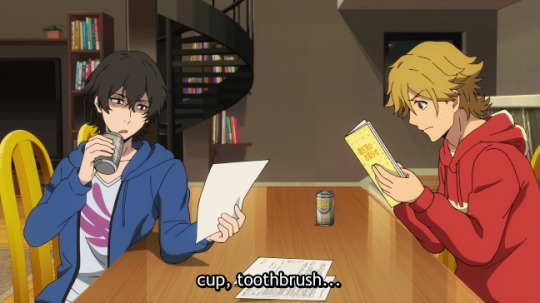
Next we see them navigating all the prep work. And even though Rei did fall asleep at one point, we see that they both put in as much effort and energy as they can to get everything right for Miri and her first day of daycare. They both read through the handbook, write her names on things, even Rei did some sewing too. They exhaust themselves out.
They think they make a great first impression on that first day:

But they make a lot of faux pas in the world of Japanese parenthood (specifically in a space that tends to be dominated by motherhood).
Arriving by car = ✘
Wearing suits that aren’t black = ✘
Having Miri wearing clothes that look expensive = ✘
Arriving by car is equated to wealth and money, and even to showing off, as opposed to riding a bike.
Wearing suits that aren’t black is associated with the underbelly side of Japan, men that work in the red light district or with the yakuza. An exception to this would be like, in many places, the entertainment business.
Dressing Miri up in clothes that look expensive plays into the whole “yakuza daughter” vibes, but also makes it so that she stands apart from the other children. It can also make it so that Miri has a difficult time putting the clothes on and off herself, which could take up class time when coming in from play time, getting ready to go home, and etc.
I worked at a juku (cram school) with a daycare. Most of the students I cared for there were native Japanese kids between 2 - 4 years old whose parents were working in America. My boss would often get annoyed when parents would bring their (usually daughters) in wearing fancy shoes that looked pretty, but hurt the child’s feet and were hard for the child to take on and off themself.
Kids around Miri’s age are also shown to be aware of economic and social class on some level as well.
LOS ANGELES, Calif. (Ivanhoe Newswire) -- Rich, poor, middle class. Parents often believe it’s their responsibility to shield their children from economic differences and social class.
But new research shows children as young as five years old are not economically blind. In fact, by the time they reach prekindergarten, kids know the difference.
This group of primary school kids already knows what money can buy.
Combine that with the (thirsty though they were) mothers who probably advised their children to not get on Miri’s bad side because of her dad’s, and her outfits that set her apart, and scenes like this one:
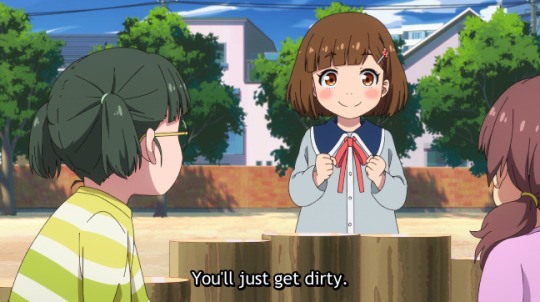
Don’t seem so out-of-place.
When Kazuki and Rei pick Miri up at school, her answer to “How was your first day? Have fun?” being “I dunno yet.’ Set’s off alarm bells - even with Rei.
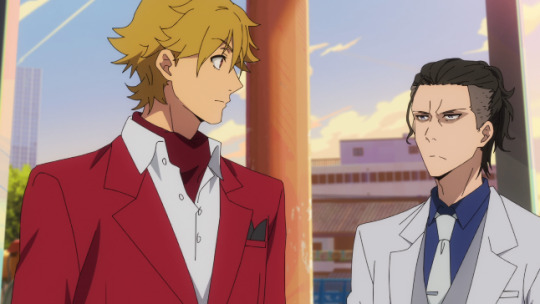
His brows are furrowed. He knows that something is off and wrong with that statement. They don’t know what they did wrong, and they don’t know how to fix it. Miri gets quieter and sadder and this is the first time they’ve had to actually deal with Miri on a deeper, emotional level.
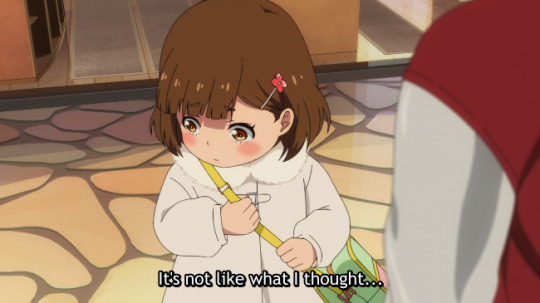
That feeling like you are failing a child (whether your own, one of your students, or just a child in your care) is such a devasting feeling. This episode expresses it well by having these scenes all take place on the way home from the daycare, when the sun is setting.
Thankfully, Kazuki is open to listening to what Miss Anna has to tell him, and she is so supportive. She doesn’t judge them or treat them like they are incompetent or incapable. She just gives them the push in the right direction, with “insider info” in a way, to get them and Miri acclimated correctly. And Rei and Kazuki jump on it. They love that they’ve found this place with a bunch of good quality cheap shit that can help them and make their lives easier.

And after this, Miri goes to school in regular clothes. Kazuki goes to the play area in the regular clothes, and he is just genuine and authentic with the kids. He doesn’t dress Miri up in a way that sets her apart anymore (on a class level, in a way that makes the other kids think she is “saying” “don’t play with me.”).
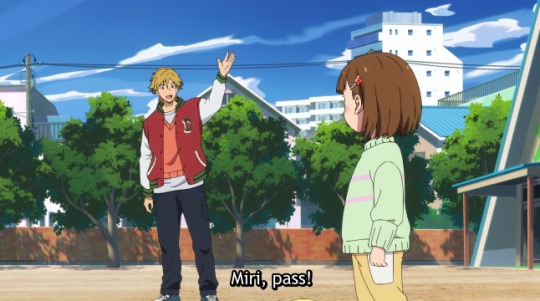
Kazuki, especially, isn’t trying to “fake it until he makes it anymore.” He isn’t trying to give the impression that they are rich. And I wouldn’t be surprised if he also felt a bit more pressure to get everything right because he and Rei are two guys raising a kid together - two FATHERS.
But then he realizes letting Miri and him and Rei just be themselves is enough.
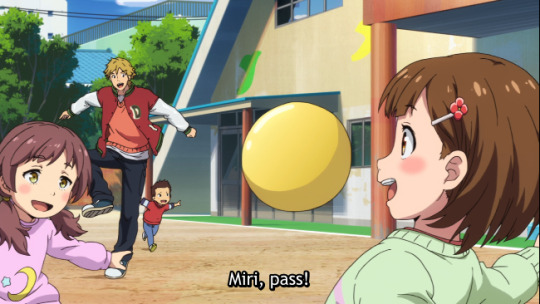
This was very much so a Kazuki issue that ended up negatively impacting Miri. A situation I’m sure every parent (or even teacher, like I’ve been before) has experienced on some level. It’s one of the harsher parts of being a parent and trying to help your child and do what’s right.
And now, he and Rei have one foot further into parenthood, since they know about this new shop and:
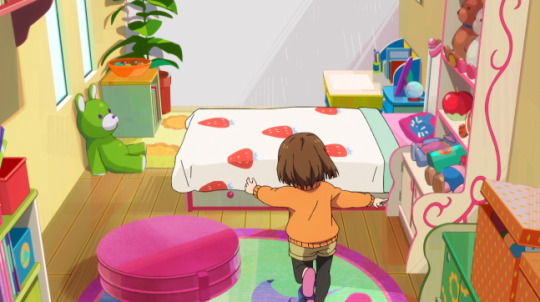
Gave Miri her own room.
That is such a big deal. Similar in a way to how people say not to name an animal unless you plan on keeping it as a pet. Not because Miri can be compared to a pet or an animal in any way like that, but because of what it implies on both an emotional attachment level and a “she is now a permanent part of our household” level.
That's a fully decorated room, filled with toys and plush dolls and games, a bed, books, a rug, even a desk. A desk filled with stationary supplies for her to learn and something which is viewed as a necessity for children to have at home when they are in elementary and junior high school (especially).
Rei and Kazuki have gone from being Miri’s “Papas” on a sort of imaginary, “playing house” level, with very limited outside and real-world/societal interactions to being her fathers. They have integrated her and themselves as her parents and fathers into society on a large level now.
By investing in that room, they are investing in Miri, and are openly choosing to be viewed as her fathers - as partners. Even if they don’t necessarily view each other in that way, it doesn’t matter to them in the end, because Miri is what’s most important.
(Note: I will link to the news article and report that stated that information about children and economic class recognition in the comments).
#Buddy Daddies#KazuRei#Kazuki Kurusu#Rei Suwa#Miri Unasaka#Anna Hanyu#Buddy Daddies spoilers#BD spoilers#long post#image heavy post#meta post#thought post#feel free to add your thoughts to this as well!
5K notes
·
View notes
Text
"i have crossed the face of the universe; i poison it to match my grief" is one of the rawest lines in Nona the Ninth. there's like a whole thesis in here but Varun just says it so plainly, and it's so human. because that's what Cytherea did! that's what John is doing! that's what Kiriona, in all her rage and grief and loss of everything she ever had, has fallen down the path of. that's Alecto, the fury of unceasing anger. that's the cycle of abuse!!!
#question for AtN: WHO is going to break free?#nona the ninth#tlt meta#varun the eater#john gaius#kiriona gaia#rotating this. wish i was more articulate but hey it's like 1230am
2K notes
·
View notes
Text
Very interesting to me that a certain subset of the BES fandom's favourite iterations of Mizu and Akemi are seemingly rooted in the facades they have projected towards the world, and are not accurate representations of their true selves.
And I see this is especially the case with Mizu, where fanon likes to paint her as this dominant, hyper-masculine, smirking Cool GuyTM who's going to give you her strap. And this idea of Mizu is often based on the image of her wearing her glasses, and optionally, with her cloak and big, wide-brimmed kasa.
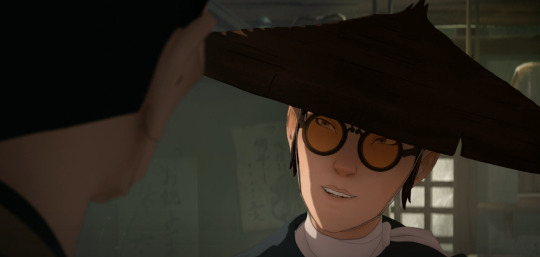

And what's interesting about this, to me, is that fanon is seemingly falling for her deliberate disguise. Because the glasses (with the optional combination of cloak and hat) represent Mizu's suppression of her true self. She is playing a role.

Take this scene of Mizu in the brothel in Episode 4 for example. Here, not only is Mizu wearing her glasses to symbolise the mask she is wearing, but she is purposely acting like some suave and cocky gentleman, intimidating, calm, in control. Her voice is even deeper than usual, like what we hear in her first scene while facing off with Hachiman the Flesh-Trader in Episode 1.
This act that Mizu puts on is an embodiment of masculine showboating, which is highly effective against weak and insecure men like Hachi, but also against women like those who tried to seduce her at the Shindo House.
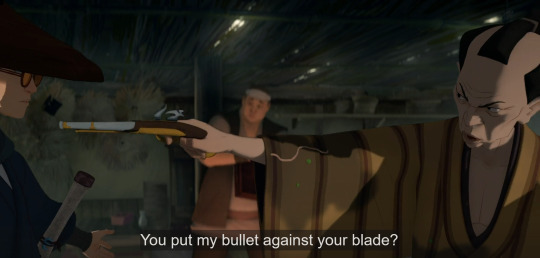

And that brings me to how Mizu's mask is actually a direct parallel to Akemi's mask in this very same scene.
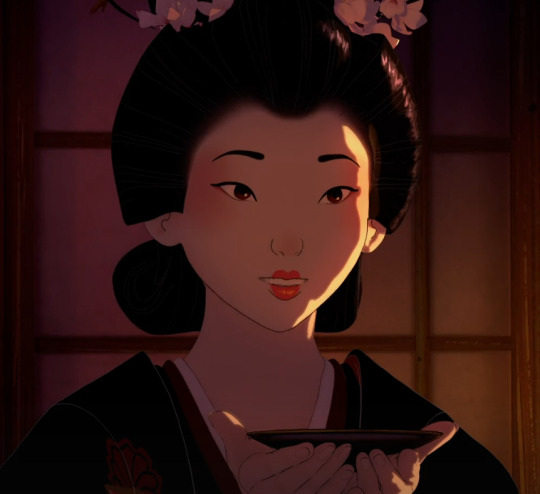
Here, Akemi is also putting up an act, playing up her naivety and demure girlishness, using her high-pitched lilted voice, complimenting Mizu and trying to make small talk, all so she can seduce and lure Mizu in to drink the drugged cup of sake.
So what I find so interesting and funny about this scene, characters within it, and the subsequent fandom interpretations of both, is that everyone seems to literally be falling for the mask that Mizu and Akemi are putting up to conceal their identities, guard themselves from the world, and get what they want.
It's also a little frustrating because the fanon seems to twist what actually makes Mizu and Akemi's dynamic so interesting by flattening it completely. Because both here and throughout the story, Mizu and Akemi's entire relationship and treatment of each other is solely built off of masks, assumptions, and misconceptions.
Akemi believes Mizu is a selfish, cocky male samurai who destroyed her ex-fiance's career and life, and who abandoned her to let her get dragged away by her father's guards and forcibly married off to a man she didn't know. on the other hand, Mizu believes Akemi is bratty, naive princess who constantly needs saving and who can't make her own decisions.
These misconceptions are even evident in the framing of their first impressions of each other, both of which unfold in these slow-motion POV shots.
Mizu's first impression of Akemi is that of a beautiful, untouchable princess in a cage. Swirling string music in the background.
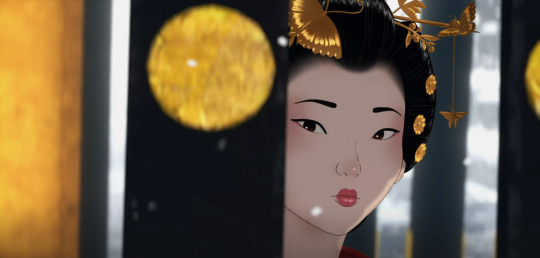
Akemi's first impression of Mizu is of a mysterious, stoic "demon" samurai who stole her fiance's scarf. Tense music and the sound of ocean waves in the background.

And then, going back to that scene of them together in Episode 4, both Mizu and Akemi continue to fool each other and hold these assumptions of each other, and they both feed into it, as both are purposely acting within the suppressive roles society binds them to in order to achieve their goals within the means they are allowed (Akemi playing the part of a subservient woman; Mizu playing the part of a dominant man).
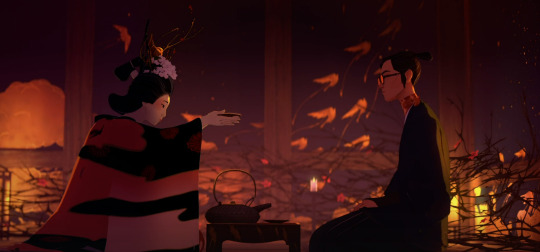
But then, for once in both their lives, neither of their usual tactics work.
Akemi is trying to use flattery and seduction on Mizu, but Mizu sees right through it, knowing that Akemi is just trying to manipulate and harm her. Rather than give in to Akemi's tactics, Mizu plays with Akemi's emotions by alluding to Taigen's death, before pinning her down, and then when she starts crying, Mizu just rolls her eyes and tells her to shut up.
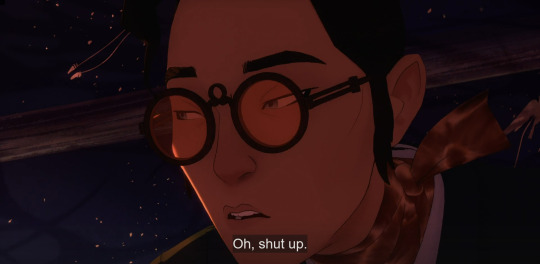
On the opposite end, when Mizu tries to use brute force and intimidation, Akemi also sees right through it, not falling for it, and instead says this:
"Under your mask, you're not the killer you pretend to be."
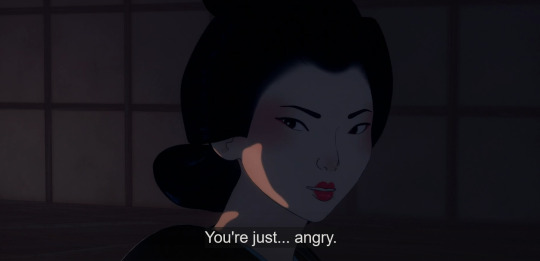
Nonetheless, despite the fact that they see a little bit through each other's masks, they both still hold their presumptions of each other until the very end of the season, with Akemi seeing Mizu as an obnoxious samurai swooping in to save the day, and Mizu seeing Akemi as a damsel in distress.
And what I find a bit irksome is that the fandom also resorts to flattening them to these tropes as well.
Because Mizu is not some cool, smooth-talking samurai with a big dick sword as Akemi (and the fandom) might believe. All of that is the facade she puts up and nothing more. In reality, Mizu is an angry, confused and lonely child, and a masterful artist, who is struggling against her own self-hatred. Master Eiji, her father figure who knows her best, knows this.
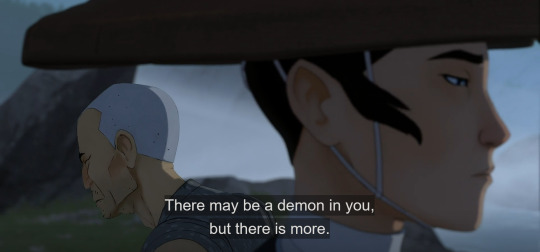
And Akemi, on the other hand, is not some girly, sweet, vain and spoiled princess as Mizu might believe. Instead she has never cared for frivolous things like fashion, love or looks, instead favouring poetry and strategy games instead, and has always only cared about her own independence. Seki, her father figure who knows her best, knows this.
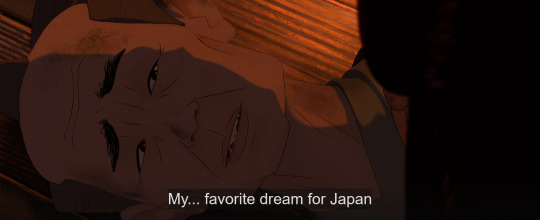

But neither is she some authoritative dominatrix, though this is part of her new persona that she is trying to project to get what she wants. Because while Akemi is willful, outspoken, intelligent and authoritative, she can still be naive! She is still often unsure and needs to have her hand held through things, as she is still learning and growing into her full potential. Her new parental/guardian figure, Madame Kaji, knows this as well.
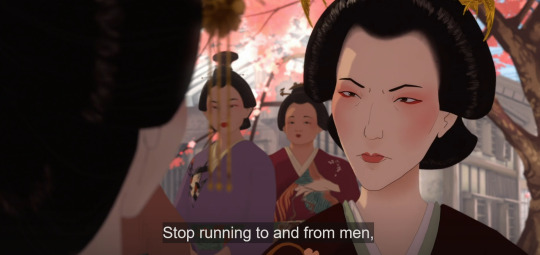
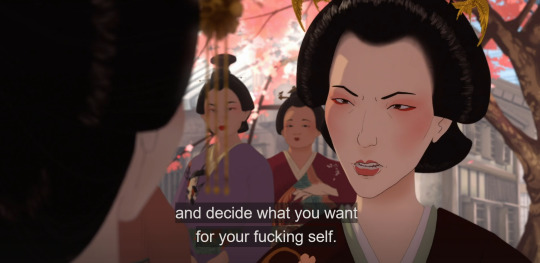
So with all that being said, now that we know that Mizu and Akemi are essentially wearing masks and putting up fronts throughout the show, what would a representation of Mizu's and Akemi's true selves actually look like? Easy. It's in their hair.
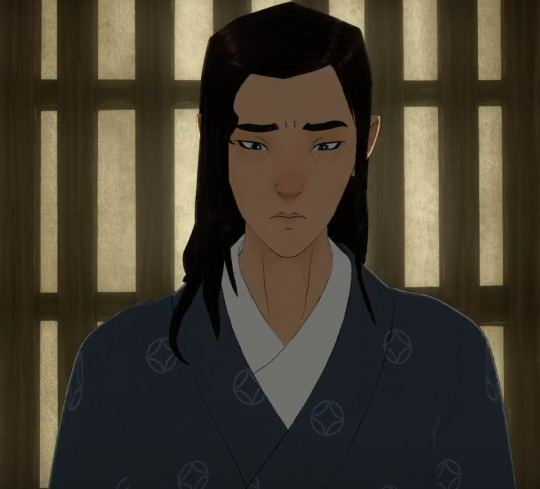

This shot on the left is the only time we see Mizu with her hair completely down. In this scene, she's being berated by Mama, and her guard is completely down, she has no weapon, and is no longer wearing any mask, as this is after she showed Mikio "all of herself" and tried to take off the mask of a subservient housewife. Thus, here, she is sad, vulnerable, and feeling small (emphasised further by the framing of the scene). This is a perfect encapsulation of what Mizu is on the inside, underneath all the layers of revenge-obsession and the walls she's put around herself.
In contrast, the only time we Akemi with her hair fully down, she is completely alone in the bath, and this scene takes place after being scorned by her father and left weeping at his feet. But despite all that, Akemi is headstrong, determined, taking the reigns of her life as she makes the choice to run away, but even that choice is reflective of her youthful naivety. She even gets scolded by Seki shortly after this in the next scene, because though she wants to be independent, she still hasn't completely learned to be. Not yet. Regardless, her decisiveness and moment of self-empowerment is emphasised by the framing of the scene, where her face takes up the majority of the shot, and she stares seriously into the middle distance.
To conclude, I wish popular fanon would stop mischaracterising these two, and flattening them into tropes and stereotypes (ie. masculine badass swordsman Mizu and feminine alluring queen but also girly swooning damsel Akemi), all of which just seems... reductive. It also irks me when Akemi is merely upheld as a love interest and romantic device for Mizu and nothing more, when she is literally Mizu's narrative foil (takes far more narrative precedence over romantic interest) and the deuteragonist of this show. She is her own person. That is literally the theme of her entire character and arc.
#blue eye samurai#mizu blue eye samurai#akemi blue eye samurai#blue eye samurai meta#just in case... im gonna tag this as#mizukemicritical#akemizucritical#though this post isnt actually criticising the ship itself but rather fanon's portrayal of the ship and the characters#for that reason lemme also tag this as#wank.mp3#feel free to disagree of course but please be civil#and if you need to rant about how wrong i am without any convincing evidence kindly feel free to make your own post. peace and love <3#fandom.rtf#meta dissertations.pdf#shut up haydar#edit: for full disclosure. i do rather dislike this ship. but obviously it's fine for anyone to enjoy it. please do! have your fun!#it's just that as usual! popular fanon and fandom around a ship is what has completely deterred me from any sense of enjoyment of it#it's a shame too because i was very open and even eager for some mizu/akemi romance in the future#but out-of-character fanon + the rudeness of certain fans has definitely soured it for me#but that doesn't mean people can't enjoy it obviously! ship and let ship!!!#plus it has its appeal which i DO STILL see and enjoy!!!!#i would even go as far as to call them soulmates because their narratives and characters are LITERALLY intertwined!!!#but. yeah. my gradual distaste for this ship is indeed very unfortunate.
667 notes
·
View notes
Text

is lyney the first character who actually is at a disadvantage in rainy weather. first character from the water nation is the first character in the game who doesn't like rain
#lyney#lynette#freminet#genshin impact#2023#fanart#lynette is a second fontaine character for purposes of this accessment bc it's funnier like this#i guess lyney likes rain until lvl 60 because free vaporize is still nice and all#but how many people are going to use him under level 60#is level 60 the a4 one?? i don't remember#vaporize lyney holding hands with vaporize nilou: who cares about reading all those passives am i right#i'm personally building him physical either way for funsies so meta be damned
2K notes
·
View notes